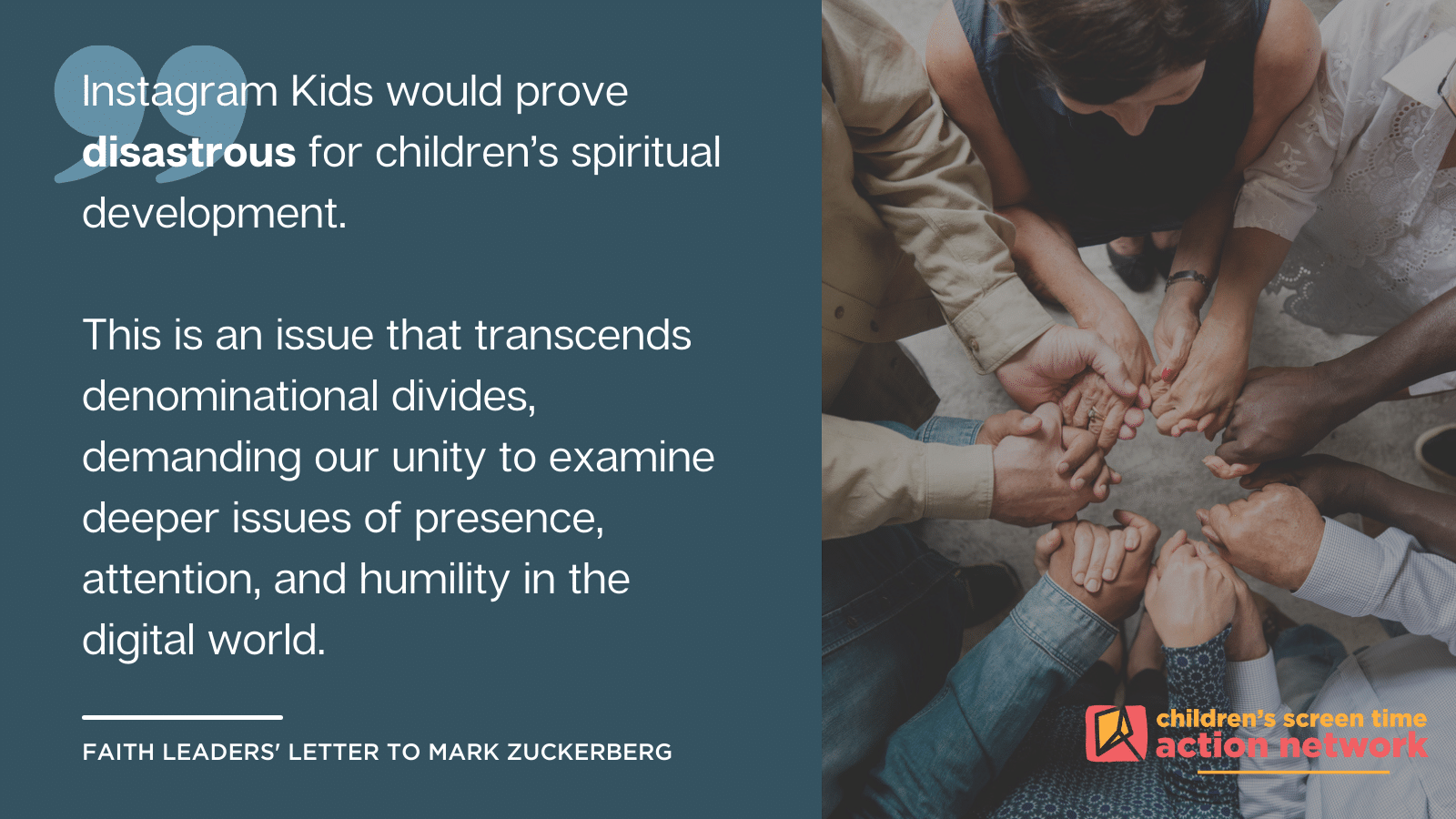
Our letter to Mark Zuckerberg is the first big advocacy initiative that the Action Network’s Interfaith Work Group has undertaken, and what a project to start with! I feel so lucky to have been given the opportunity to co-chair the group and pursue this campaign with Andrea Davis and Rinny Yourman.
We decided to undertake this project because the spiritual effects of social media on children have rarely been discussed. Past initiatives against Instagram for Kids emphasized the very real physical, psychological, and social harms of excessive screen time, but spiritual health remained largely absent from the discussion. And of course it did! Qualities like attention, presence, empathy, and stillness are subjective and nearly impossible to measure. It’s not like you can point to a peer-reviewed study that displays “decreases in spirituality” in a tweetable bar graph. Not to mention that there are as many different definitions of spirituality as there are people on the planet!
Still, though, disparate voices in religious communities were speaking passionately about the issue. Youth ministers, community rabbis, and Buddhist monks all had written about social media’s war on attention, the rapt potential for technological idolization, and the many spiritual harms and challenges screens pose for children. Excessive screen time affects nearly every aspect of the spiritual life, and religious communities have noticed. So we wondered: what would happen if faith leaders from all walks of life could unite under the common goal of protecting children online? Would they?
Andrea, Rinny and I were thrilled about the idea, proposed it to the Work Group, and happily set off to compose the letter.
After detailing the many physical and psychological harms of Instagram for Kids, we drew upon a wide range of spiritual traditions to speak to the larger truths that our many faiths and denominations all stand behind – the importance of compassion, understanding, presence, patience, and self-esteem – and how the project would harm children’s spiritual development. Our letter includes quotes ranging from ancient texts to modern theologians, demonstrating the enduring relevance of spiritual guidance and the shared values that speak to us today.
From compassion to stillness to humility, social media infringes upon values dear to countless religious traditions. Addictive algorithms and constant communication systems prevent moments of sustained, attentive reflection, from prayer to yoga to meditation. In addition, Instagram famously depends on self-promotion; steeped in materialism, it demands users measure up, show off, and anxiously compare themselves to others – all habits that contradict countless spiritual paths. Lack of connection to the natural world, the internet’s belligerent us vs. them mentality, and a focus on external validation only alienate us from ourselves and others. The Interfaith Work Group believes that exposing children to this environment before spiritual or emotional maturity would surely be a mistake, as everyone deserves a chance to explore their spiritual selves if they so choose.
These near-universal values – coupled with the plethora of scientific research detailing social media’s emotional, physical, and mental harms – made it clear that Instagram for Kids is a bad idea, both spiritually and secularly. And faith leaders from around the world agreed: over 75 religious leaders representing Buddhist, Christian, Hindu, Interfaith, Humanist, Jewish, Muslim, Pagan, Sikh, and Spiritualist traditions signed on to our letter.
As a young person, I have experienced firsthand the alienating effects of screens, from joining the Zoom College Student ranks during the pandemic to feeling the constant pressure of my phone in my pocket. However, I know that my own faith has equipped me with community, prayer, and purpose, all tools that ameliorate these effects; many of my peers feel the same, arguing that religious organizations have an important role to play in the screen time discussion.
In a world that wages war on our attention – which really, is our foundation for love, service, and devotion – faith leaders offer a unique perspective and locus of change. Many represent a way of life that values slowness, intentionality, and embodied action, all priorities antithetical to the ethos of screens. On the most basic level, we know that social media is designed to monopolize our attention, so the longer we can protect children online – the more we can promote presence, silliness, purpose, and play – the better.
Are you a faith leader concerned about the potential spiritual impacts of Instagram for Kids? Add your name to our letter here!